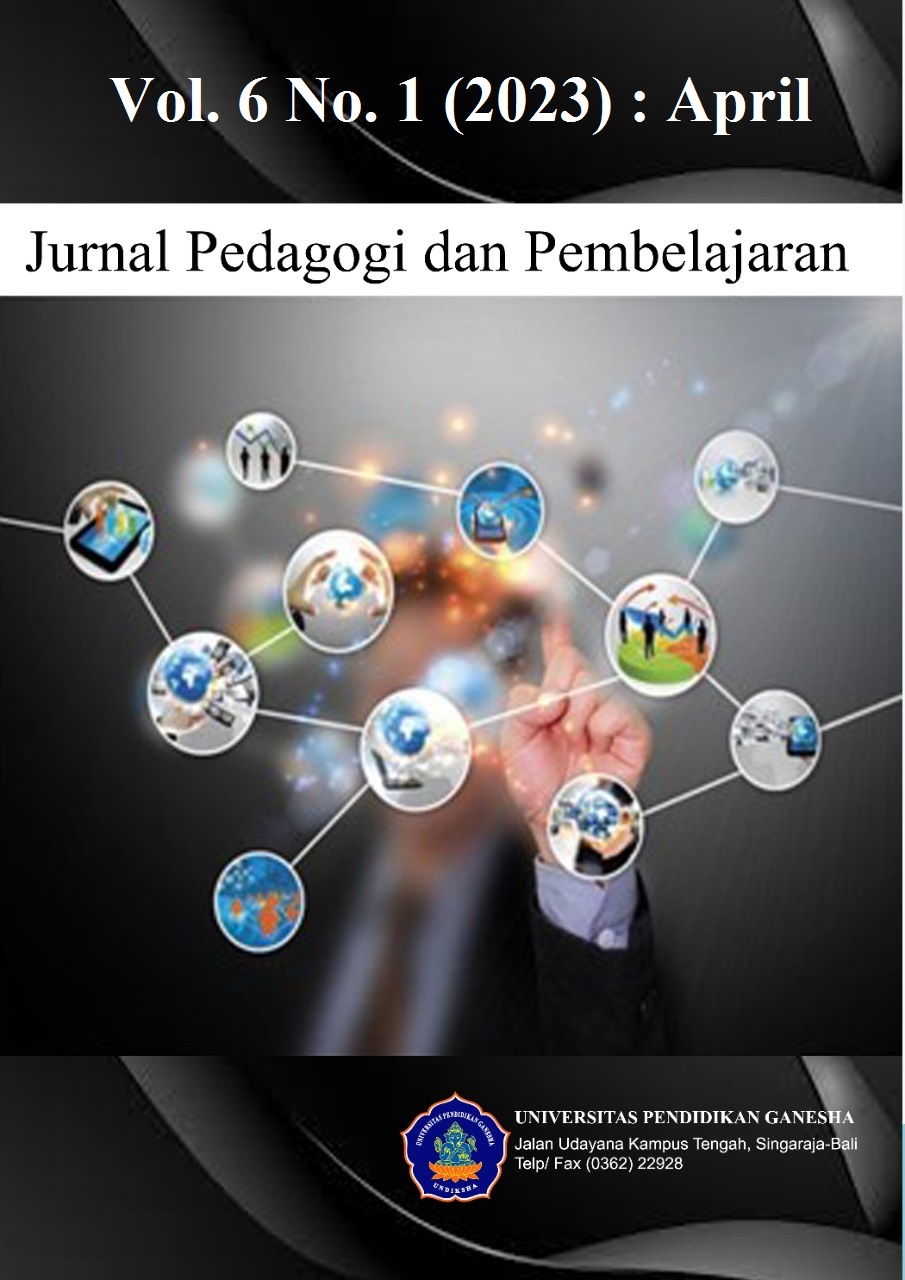The Effect of Strategic and Directive Leaderships on School Leader’s Performance
DOI:
https://doi.org/10.23887/jp2.v6i1.57599Keywords:
School principal, Strategic and Directive Leaderships, School PerformanceAbstract
School leaders have a number of roles that should be played together, including educators, managers, administrators, supervisors, motivators, entrepreneurs, and leaders. The role of school leaders as leaders and as instructional leaders specifically.This study aims to analyses the correlation between strategic and directive leadership on school leaders performance. The analysis used is a qualitative approach with a correlation design. This research was conducted using a survey method. The population in this study was the leader staffs (head and deputy head) of schools from kindergarten to high school/vocational school. The samples were taken from all existing leaders. The method used was regression and correlation as well as a significance test with the F test and the coefficient of determination (R2). The population in this study were the leadership staff (heads and deputy heads) of schools starting from kindergarten to high school/vocational school. The sample/population was taken from all the existing leaders, as many as 18 people. This study also used interview and questionnaire techniques, namely holding questions and answers with representative sources to answer problems in the field (school). The analysis used is a qualitative approach with a correlation design. The results of the study showed that Strategic and directive leaderships have a significant effect on the school leader’s performance. Strategic leadership has a stronger influence on leadership performance, while directive leadership has a weaker influence.
References
Aisyah, S., & Astuti, R. (2021). Analisis Mengenai Telaah Kurikulum K-13 pada Jenjang Sekolah Dasar. Jurnal Basicedu, 5(6), 6120–6125. https://doi.org/10.31004/basicedu.v5i6.1770. DOI: https://doi.org/10.31004/basicedu.v5i6.1770
AlAjmi, M. K. (2022). The impact of digital leadership on teachers’ technology integration during the COVID-19 pandemic in Kuwait. International Journal of Educational Research, 101928. https://doi.org/https://doi.org/10.1016/j.ijer.2022.101928. DOI: https://doi.org/10.1016/j.ijer.2022.101928
Avidov-Ungar, O. (2016). A model of professional development: teachers’ perceptions of their professional development. Teachers and Teaching: Theory and Practice, 22(6), 653–669. https://doi.org/10.1080/13540602.2016.1158955. DOI: https://doi.org/10.1080/13540602.2016.1158955
Bush, T., & Glover, D. (2016). School leadership and management in South Africa. International Journal of Educational Management, 30(2), 211–231. https://doi.org/10.1108/IJEM-07-2014-0101. DOI: https://doi.org/10.1108/IJEM-07-2014-0101
Chan, T., Ridley, A., & Robert. (2022). Principals’ Perceptions of Their Roles as Curriculum Leaders: Comparison of High, Middle, and Elementary Schools. Educational Research and Development Journal, 25(1), 82–98. https://doi.org/10.3102/1880803. DOI: https://doi.org/10.3102/1880803
Creswell, J. W., & Poth, C. N. (2016). Qualitative inquiry and research design: Choosing among five approaches. Sage publications.
Díez, F., Villa, A., López, A. L., & Iraurgi, I. (2020). Impact of quality management systems in the performance of educational centers: educational policies and management processes. Heliyon, 6(4), e03824. https://doi.org/https://doi.org/10.1016/j.heliyon.2020.e03824. DOI: https://doi.org/10.1016/j.heliyon.2020.e03824
Dike, D. D. (2019). Pola Kepemimpinan Kepala Sekolah Dalam Penguatan Karakter Di Sekolah Dasar Kota Sintang Kalimantan Barat. Profesi Pendidikan Dasar, 1(2), 145–164. https://doi.org/10.23917/ppd.v1i2.9159. DOI: https://doi.org/10.23917/ppd.v1i2.9159
Flores, M. A., & Derrington, M. L. (2017). School principals’ views of teacher evaluation policy: Lessons learned from two empirical studies. International Journal of Leadership in Education, 20(4), 416–431. https://doi.org/10.1080/13603124.2015.1094144. DOI: https://doi.org/10.1080/13603124.2015.1094144
Hendriks, M. A., & Scheerens, J. (2013). School leadership effects revisited: A review of empirical studies guided by indirect-effect models. School Leadership and Management, 33(4), 373–394. https://doi.org/10.1080/13632434.2013.813458. DOI: https://doi.org/10.1080/13632434.2013.813458
Kalkan, Ö. K., Altun, A., & Atar, B. (2020). Role of teacher-related factors and educational resources in science literacy: An international perspective. Studies in Educational Evaluation, 67(August). https://doi.org/10.1016/j.stueduc.2020.100935. DOI: https://doi.org/10.1016/j.stueduc.2020.100935
Kim, W. C., & Mauborgne, R. (2002). Charting your company’s future. Harvard Business Review, 80(6), 76–85. https://scholar.archive.org/work/cruf2ylvs5cyxp2upp2l3f6s5m/access/wayback/http://techventures.wdfiles.com/local--files/lesson-marketing-fundamentals/hbr-strategy-canvas.
Kristiawan, M., & Yuliandri, J. (2017). Peran Kepemimpinan Kepala Sekolah Terhadap Peningkatan Kinerja Guru. Jurnal Manajemen, Kepemimpinan, Dan Supervisi Pendidikan.
Lawrence, J. E., & Tar, U. A. (2018). Factors that influence teachers’ adoption and integration of ICT in teaching/learning process. Educational Media International, 55(1), 79–105. https://doi.org/10.1080/09523987.2018.1439712. DOI: https://doi.org/10.1080/09523987.2018.1439712
Lie, D., Sherly, S., Dharma, E., & Sudirman, A. (2019). The Impact of Work Discipline and Work Ethic on the Teacher Performance of Sultan Agung Pematangsiantar Private Middle School Teachers T.A. 2018/2019. International Journal of Business Studies, 3(3), 125–135. https://doi.org/10.32924/ijbs.v3i3.83. DOI: https://doi.org/10.32924/ijbs.v3i3.83
Madrazo, A. L., & Dio, R. V. (2020). Contextualized learning modules in bridging students’ learning gaps in calculus with analytic geometry through independent learning. Journal on Mathematics Education, 11(3), 457–476. https://doi.org/10.22342/jme.11.3.12456.457-476. DOI: https://doi.org/10.22342/jme.11.3.12456.457-476
Marmoah, S. (2016). Administrasi Dan Supervisi Pendidikan Teori Dan Praktek. Deepublish.
Minsih, M., Rusnilawati, R., & Mujahid, I. (2019). Kepemimpinan Kepala Sekolah Dalam Membangun Sekolah Berkualitas Di Sekolah Dasar. Profesi Pendidikan Dasar, 1(1), 29–40. https://doi.org/10.23917/ppd.v1i1.8467. DOI: https://doi.org/10.23917/ppd.v1i1.8467
Mjaku, G., & Ph, D. (2020). Strategic Management and Strategic Leadership. 10(8), 914–918. https://doi.org/10.29322/IJSRP.10.08.2020.p104113. DOI: https://doi.org/10.29322/IJSRP.10.08.2020.p104113
Mukhlasin, A. (2021). Kepemimpinan Kepala Sekolah Kunci Keberhasilan dalam Pencapaian Kualitas Pendidikan. Journal Of Administration and Educational Management (ALIGNMENT), 4(2), 193–199. https://doi.org/10.31539/alignment.v4i2.2566. DOI: https://doi.org/10.31539/alignment.v4i2.2566
Navaridas-Nalda, F., Emeterio, M. C.-S., Fernández-Ortiz, R., & Arias-Oliva, M. (2020). The strategic influence of school principal leadership in the digital transformation of schools. Computers in Human Behavior, 112. https://doi.org/10.1016/j.chb.2020.106481. DOI: https://doi.org/10.1016/j.chb.2020.106481
Nurdin, F., Ihsan, M., Rahmawati, I., & Lestari, H. (2020). Pengaruh Kepemimpinan Transformasional dan Budaya Organisasi Terhadap Perilaku Kerja Inovatif Guru Di SMA Swasta Se-Kecamatan Pamijahan Bogor. Indonesian Journal of Science, 1(2), 99–105. https://doi.org/10.1234/jsi.v1i2.8.
Nurmala, S., & Widyasari, S. D. (2021). Self efficacy dan Openness terhadap Perilaku Kerja Inovatif pada Kementerian Dalam Negeri. Psychopolytan : Jurnal Psikologi, 4(2), 92–100. https://doi.org/10.36341/psi.v4i2.1508. DOI: https://doi.org/10.36341/psi.v4i2.1508
Purnama., I., Nyoto., & Komara, A. H. (2019). The Influence of Leadership Style, Work Motivation, Andwork Environment On Job Satisfaction And Employee Organizational Commitment In Pelita Indonesia Pekanbaru College. Procuratio: Jurnal Ilmiah Manajemen, 7(2), 152–164. http://www.ejournal.pelitaindonesia.ac.id/ojs32/index.php/PROCURATIO/article/view/443.
Putra, C. B., Utami, H. N., & Hakam, M. S. (2013). Pengaruh Gaya Kepemimpinan Direktif, Suportif, Dan Partisipatif Terhadap Kinerja Karyawan (Studi Pada PT. Astra Internasional Tbk. Daihatsu Malang). Jurnal Administrasi Bisnis S1 Universitas Brawijaya, 2(2), 11–20. http://download.garuda.kemdikbud.go.id/article.php?article=189325&val=6468&title=pengaruh gaya kepemimpinan direktif suportif dan partisipatif terhadap kinerja karyawan studi pada pt astra internasional tbk daihatsu malang.
Raharjo, S. B. (2018). Evaluasi Trend Kualitas Pendidikan Di Indonesia. Jurnal Penelitian Dan Evaluasi Pendidikan, 16(2), 511–532. https://doi.org/10.21831/pep.v16i2.1129. DOI: https://doi.org/10.21831/pep.v16i2.1129
Rodríguez-Abitia, G., & Bribiesca-Correa, G. (2021). Assessing digital transformation in universities. Future Internet, 13(2), 1–17. https://doi.org/10.3390/fi13020052. DOI: https://doi.org/10.3390/fi13020052
Şemin, F. K. (2019). Competencies of principals in ensuring sustainable education: Teachers’ views. International Journal of Evaluation and Research in Education, 8(2), 201–212. https://doi.org/10.11591/ijere.v8i2.18273. DOI: https://doi.org/10.11591/ijere.v8i2.18273
Shulhan, M. (2018). Leadership style in the madrasah in Tulungagung: how principals enhance teacher’s performance. International Journal of Educational Management, 32(4), 641–651. https://doi.org/10.1108/IJEM-08-2017-0218. DOI: https://doi.org/10.1108/IJEM-08-2017-0218
Simanjuntak, J. M. (2021). The Impact of Principal Leadership on The Effectiveness of Learning in Christian Senior High School in Bandung, Indonesia. Kelola: Jurnal Manajemen Pendidikan, 8(1), 11–21. https://doi.org/10.24246/j.jk.2021.v8.i1.p11-21. DOI: https://doi.org/10.24246/j.jk.2021.v8.i1.p11-21
Subandi, S. (2018). Kontribusi Kepemimpinan Kepala Sekolah, Motivasi Kerja,dan Iklim Sekolah terhadap Kinerja Guru. Jurnal Penelitian Dan Pengembangan Sains Dan Humaniora, 1(2), 57–63. https://doi.org/10.23887/jppsh.v1i2.12934. DOI: https://doi.org/10.23887/jppsh.v1i2.12934
Sunaengsih, C., Anggarani, M., Amalia, M., Nurfatmala, S., & Naelin, S. D. (2019). Principal Leadership in the Implementation of Effective School Management. 6(1), 79–91. https://doi.org/10.17509/mimbar-sd.v6i1.15200. DOI: https://doi.org/10.53400/mimbar-sd.v6i1.15200
Tanjung, R., Supriani, Y., Mayasari, A., & Arifudin, O. (2022). Manajemen Mutu Dalam Penyelenggaraan Pendidikan. Jurnal Pendidikan Glasser, 6(1), 29. https://doi.org/10.32529/glasser.v6i1.1481. DOI: https://doi.org/10.32529/glasser.v6i1.1481
Ulfathmi, U., Arafat, Y., & Setiawan, A. A. (2021). The Influence of Principal Leadership and Work Motivation on Teacher Performance. Journal of Social Work and Science Education, 2(2), 160–168. https://doi.org/10.52690/jswse.v2i2.238. DOI: https://doi.org/10.52690/jswse.v2i2.238
Usman, H. (2016). Peran Baru Administrasi Pendidikan: Dari Sistem Sentralistik Menuju Sistem Desentralistik. Jurnal Ilmu Pendidikan, 8(1). https://doi.org/10.17977/jip.v8i1.512.
Zia-ud-din, M., Shabbir, M. A., Asif, S. Bin, & Bilal, M. (2017). Impact of Strategic Leadership on Employee Performance. August, 7–22. https://doi.org/10.6007/IJARBSS/v7-i6/2938. DOI: https://doi.org/10.6007/IJARBSS/v7-i6/2938
Zuryati, Djailani, & Usman, N. (2015). Gaya Kepemimpinan Kepala Sekolah Dalam Meningkatkan Kinerja Guru Pada Sdn 7. Jurnal Administrasi Pendidikan Pascasarjana Universitas Syiah Kuala, 3(2), 38–48. http://202.4.186.66/JAP/article/download/2566/2425.
Downloads
Published
How to Cite
Issue
Section
License
Copyright (c) 2023 I Made Sila, I Made Sutika, I Made Astra Winaya, I Nengah Sudiarta, I Gede Sujana, Ida Bagus Rai

This work is licensed under a Creative Commons Attribution-ShareAlike 4.0 International License.
Authors who publish with Jurnal Pedagogi dan Pembelajaran agree to the following terms:- Authors retain copyright and grant the journal the right of first publication with the work simultaneously licensed under a Creative Commons Attribution License (CC BY-SA 4.0) that allows others to share the work with an acknowledgment of the work's authorship and initial publication in this journal
- Authors are able to enter into separate, additional contractual arrangements for the non-exclusive distribution of the journal's published version of the work (e.g., post it to an institutional repository or publish it in a book), with an acknowledgment of its initial publication in this journal.
- Authors are permitted and encouraged to post their work online (e.g., in institutional repositories or on their website) prior to and during the submission process, as it can lead to productive exchanges, as well as earlier and greater citation of published work. (See The Effect of Open Access)













